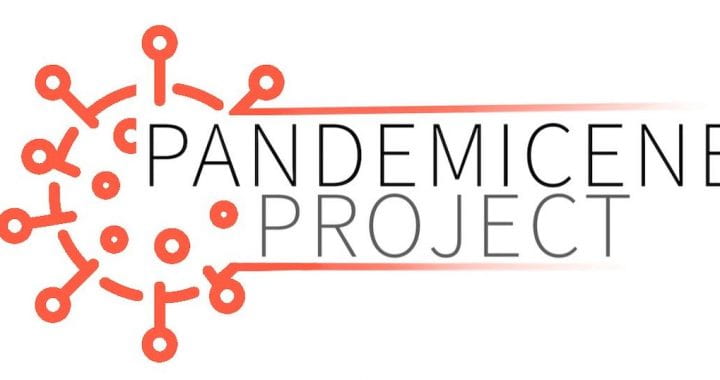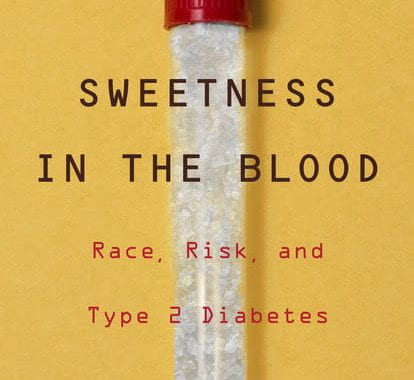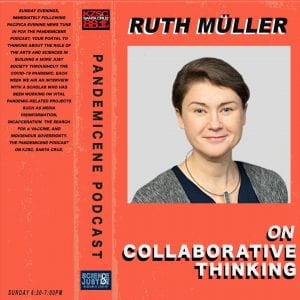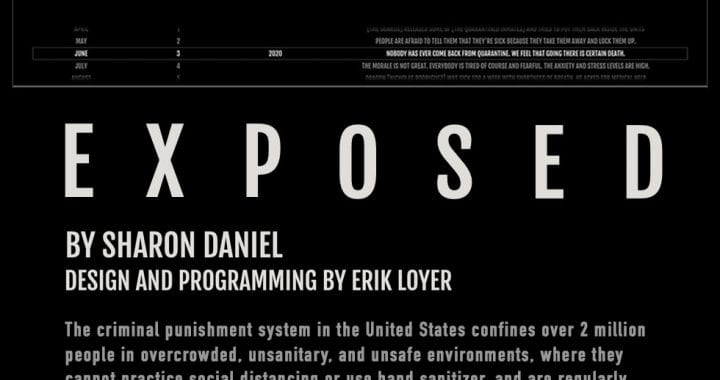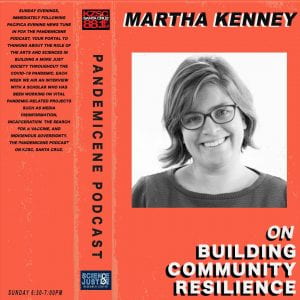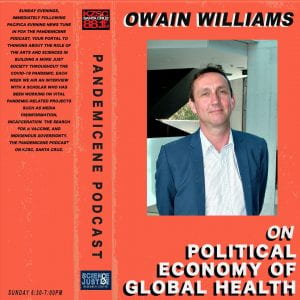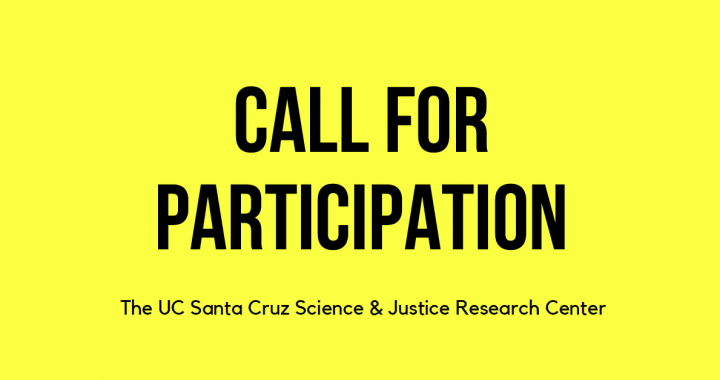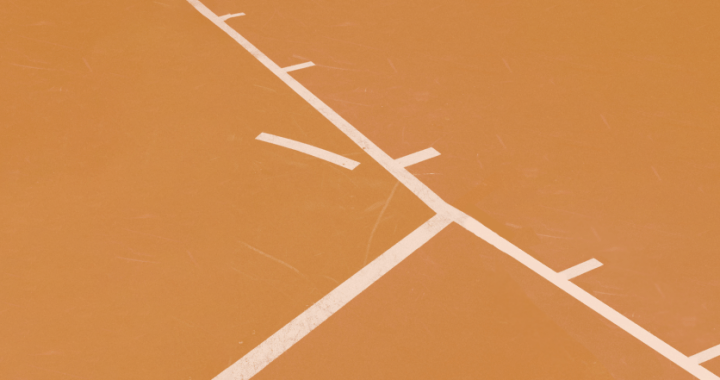Through engaging our communities the Science & Justice Research Center (SJRC) is producing knowledge that can help all of us – scholars and scientists, students and activists – imagine and enact just futures both in our home state of California and in our communities worldwide.
As the SJRC responded to the Covid-19 pandemic, we began Season 1 of our Pandemicene Project in March 2020 from the premise that creating trust-worthy knowledge that can foster a more just world requires attending to the deep inequalities and fissures in the polity that this pandemic has laid bare. The developing areas of concern were captured in the campus news article, “Discrimination, governance, and trust in the age of COVID-19”, featuring SJRC Founding Director Jenny Reardon. In Season 1, UCSC faculty, staff, graduate and undergraduate students worked together to interview members of the Science & Justice network about scholarly responses to this critical historical moment. A podcast series with 9 episodes produced by students aired on our local radio station (KZSC 88.1 FM) Sunday evenings, and the blog series on the SJRC website expanded. The Daily Beast Interview, featuring James Doucet-Battle, assistant professor of sociology and interim director of SJRC, highlighted the glaring race problems of COVID-19 vaccine trials, while the special issue of Transactions of the Institute of British Geographers featuring S&J Advisor and Politics Professor Matt Sparke’s article, “Contextualizing Coronavirus Geographically,” provided additional articles and perspectives on the pandemic. The first installment of the series, Dialogues on COVID-19 and Racism, by SJRC’s Theorizing Race after Race (TRAR) working group, “Black Geographies of Quarantine: A Dialogue with Brandi Summers, Camilla Hawthorne, and Theresa Hice Fromille” published on the UCHRI’s The Foundry.
Attending to what is going on locally (e.g., from the shelter-in-place locations of researchers), while drawing on the power and insights of our community elders and networks, over Winter and Spring 2021 the SJRC’s Pandemicene Project will launch Season 2. Season 2 will produce another round of podcast episodes and will expand to work in tandem with several new and established collaborative SJRC projects, as described below, that in their own way each help answer our overarching question of how to create knowledge that orients us towards justice in the middle of both a viral pandemic and a pandemic of social inequality and racial discrimination that has sparked global unrest. In Winter quarter, undergraduate student interns, representing the following 14 majors and minors, will join current SJRC researchers: Biochemistry, Cognitive Science, Critical Race and Ethnic Studies, Economics, Feminist Studies, Film and Digital Media, Legal Studies, Literature, Molecular, Cell, & Developmental Biology, Philosophy, Politics, Psychology, Sociology, and Statistics. Learn more about the students and independent researchers.
Our work over Season 2 will culminate in an ImaginACTivism workshop in Spring term. Stay tuned for a Call for Participation and Papers.
The following collaborative center projects will help feed Season 2:
The COVID-19 Pandemicene Project: Re-Worlding Toward Justice – Researchers will expand the zine, blog and podcast series by interviewing policy makers, practitioners, and mutual-aid and community organizers. Current student leads are looking to incorporate additional mediums (ie: animations, soundscapes, illustrations, etc.) and promotion methods (ie: social media, charts, graphics, photographs, maps, other new or historical oral and written materials). Students will help design and guide an ImaginACTivism workshop in Spring term. Learn more: The Pandemicene Project.
Incarcerated Care – In addition to joining a cohort of SJRC researchers in The Pandemicene Project, students will work directly with Film and Digital Media Professor Sharon Daniel’s team to expand the Unjustly Exposed interactive documentary website on COVID-19 in prisons and jails. Learn more: Season 1 Episode 4: Public Art and Carcerality.
Just Biomedicine: Orphan Drugs – In addition to joining a cohort of SJRC researchers in The Pandemicene Project, students will work with Dr. Andy Murray (UCSC Sociology alumni, SJTP graduate fellow and independent researcher) and UCSC faculty associated with the Center for Open Access Splicing Therapeutics (Jeremy Sanford, Michael Stone, Jenny Reardon, James Doucet-Battle, Matt Sparke). Students will research items related to pharmaceutical licensing agreements and bringing drugs to the market, and help the C.O.A.S.T. team understand the critical ethical and justice issues related to orphan-disease drug discovery and dissemination of splicing-based therapies. Learn more: Season 1 Student Blog.
Just Biomedicine: Third St. – In May, research from the SJRC Just Biomedicine Third St. research cluster will publish a chapter, “Just Biomedicine on Third Street? Health and Wealth Inequities in SF’s Biotech Hub” in a book (an atlas) titled, Counterpoints: A San Francisco Bay Area Atlas of Displacement and Resistance. Students will help SJRC celebrate and advertise its launch with contributors in Spring. Learn more: Season 1 Episode 6: Housing Justice and Big Tech.
Laboratory Life and Social Death: The Problem of Diversity in Science and Society – In addition to joining a cohort of SJRC researchers in the Pandemicene Project, students will work directly with Sociology Assistant Professor James Doucet-Battle on linkages between the social sciences, African Diaspora Studies, history, politics, and genomic science curriculum and training to conceptualize and develop an engaging and interactive online summer program in partnership with the Historically Black Colleges and Universities. Students will assist with research on and collecting materials related to the rigor, reproducibility and diversity of biomolecular data; identify other all-campus resources serving ABC students (ie: partner with AARC, HSI initiative, ODEI) and known challenges specific to summer sessions (refer to current BSU demands). Learn more: Bioethical Matriarchy (Doucet-Battle 2016), UC/HBCU initiative.
Theorizing Race After Race – In addition to joining a cohort of SJRC researchers in the Pandemicene Project, students will work directly with Sociology faculty James Doucet-Battle, Camilla Hawthorne, Jaimie Morse, and Jenny Reardon on a series of COVID-related racial health disparities research projects. Learn more: Black Geographies of Quarantine.

